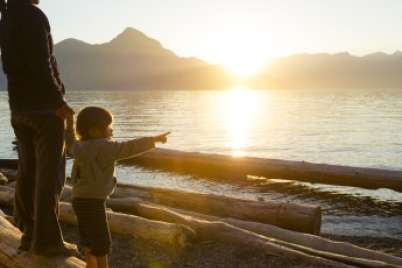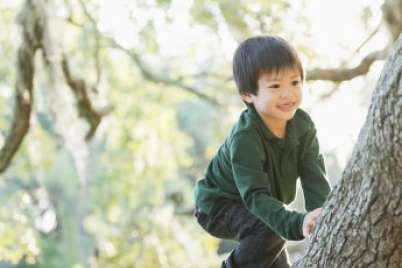
Why outdoor play is more important than ever
There’s a lot we don’t know about what life will be like as we all learn to live with COVID-19. But there’s one thing we can say for sure: active, outdoor play is exactly what our kids need right now.
Our kids need time for quiet contemplation away from the constant distraction of screens. Active, unstructured play outdoors gives kids time to innovate, think, reflect, and just be alone with their thoughts. It also gives children a healthy way to work through their fears, feelings, and understanding of this pandemic [PDF].
About the author
Megan Zeni is a B.C. teacher and mom of three who specializes in outdoor, play-based learning for elementary school children. She shares her tips for outdoor learning on her blog.
It’s a good time to let your kids get bored. Let them be messy. Make your peace with some expressions of boredom, some mess. Real learning is often born of frustrations. Allowing our kids to “get messy and make mistakes,” as Ms. Frizzle would say, is the secret sauce for engaged and meaningful learning.
Overcoming obstacles to outdoor play
For some families, getting kids to play outside is easier said than done. Maybe you don’t have a backyard or nearby park where kids can play safely. Maybe you don’t have a lot of money to spend on a backyard play set or new toys for outdoor play. And what if your kids don’t seem interested in going outside at all?
The good news is, less is more when it comes to preparing spaces for independent play outdoors.
You don’t have to have a backyard
If your family’s access to outdoor play space is limited, work with what you have. Maybe that means clearing off a bit of patio space, or cleaning out the cobwebs from under the front steps.
If you don’t have any yard or patio space, look for a nice climbing tree or a nearby community space that might offer some creative play possibilities on your next neighbourhood walkabout.
You don’t need to spend a lot of money
When we prepare space for imaginative play, we seed the environment with rich opportunities for exploration. Thankfully, materials for imaginative outdoor play can be portable, easily upcycled or collected, and are usually free or low-cost.
Here are some great, and inexpensive, materials that serve as invitations for loose parts play outdoors:
- Sticks, stones, and pinecones
- Tarps
- Old bedsheets
- Spring clamps
- Crates or storage boxes, like large Tupperware bins
- Cardboard boxes or just about anything from your recycling bin, like egg cartons or toilet paper rolls
- Old kitchen gadgets, like stainless steel bowls, spatulas, whisks, muffin tins, and cookie pans
- Log stumps
- Sidewalk chalk
- “Junkyard” playground materials like winter tires, warehouse pallets, or cable spools
- Home repair project offcuts, bits and pieces like clean plumbing elbows, or scraps of plywood
- Dress up or costume materials
- Scarves or scrap fabrics
What to do if your child doesn’t want to play outside
The key to introducing outdoor, imaginative loose parts play to kids is to slowly introduce materials. Don’t overwhelm your kids with options.
Try starting with a single bedsheet. Invite your child to see what they could make with it. An invitation or prompt like, “Could you make a shady reading nook?” or “Let’s make you an office to work in too!” might be all that’s required.
If your child has very little experience with this kind of play, you might need to start by asking the child how you could help them create a space that is of particular interest to them right now. For example, some children may like the idea of building a hospital, school, or playground for their stuffed animals.
Related read: Parent-tested tips to encourage independent play
Avoid making suggestions on how to play or build their creation, or correcting ideas that you know won’t work. Let your child learn through trial and error, so they can discover the possibilities each material offers.
Follow the lead of your child and allow them to direct the construction and creation of their playscape. Slowly add in other bits and pieces as the play progresses, and then step aside. Before you know it, you’ll have ignited your child’s instinct for creative play. Over time, your child will play more independently and with less active supervision.
In children’s play, less is more
Children with too many options can suffer from the analysis paralysis of not knowing what to play with, especially if they are not accustomed to wide open time for unstructured play already.
Your child needs a safe space for freely chosen play. Your role is to provide the time, space, and occasionally some provisions for play—and to get out of the way. Children require remarkably little interference from adults once these conditions are in place.
Related read: Be a “lifeguard parent”
Let your kids feel like they own their play space. Giving your kids the opportunity to play without your involvement will increase their sense of satisfaction in screen-free play. Families who place the responsibility of entertaining oneself entirely on the child can look forward to enthusiastic play that results in happier and more agreeable kids going forward.
The best advice for outdoor play is to just do it. Start small, and slowly increase time spent outside and materials offered for play.






The best thing about outdoor equipment’s is that it is environment friendly. It gives you no headaches in terms of utility bills. The Gym equipment’s are very powerful and doesn’t require much maintenance. Undergoing rigorous workout sessions is not the only way to get your fitness goals achieved. You can achieve your fitness goals through outdoor gym equipment’s.
Great write up Megan! With schools closes and restrictions on social activities, children can become really dull. Outdoor play is particularly important for their physical and mental well-being. Thanks for sharing what to keep in mind during outdoor play.
Great article Megan! Outdoor play is not only important for physical health, but emotional and cognitive developments as well. With Covid-19 restrictions, children are definitely suffering. But the tips provided by you are really helpful for overcoming this.